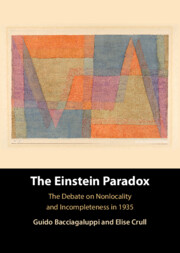Book contents
- Frontmatter
- Dedication
- Contents
- Preface
- Permissions and Copyright Notices
- Permissions and Copyright Notices
- Part I Main Contributions to the EPR Debate in 1935
- 1 Einstein on EPR
- 2 Others on EPR
- 3 Schrödinger on EPR
- 4 Heisenberg on EPR
- 5 Bohr on EPR
- Part II Selected Pre-EPR Papers
- 6 Knowledge of Past and Future in Quantum Mechanics
- 7 On the Indeterminacy Relation
- 8 Bohr.Einstein Example
- Part III Core EPR Papers
- 9 Can Quantum-Mechanical Description of Physical Reality be Considered Complete?
- 10 Discussion of Probability Relations Between Separated Systems
- 11 The Present Situation in Quantum Mechanics
- 12 Note on the Quantum-Mechanical Theory of Measurement
- 13 Remarks on Measurements in Quantum Theory
- 14 Is a Deterministic Completion of Quantum Mechanics Possible?
- 15 The Natural-Philosophical Foundations of Quantum Mechanics (Excerpt)
- 16 Can Quantum-Mechanical Description of Physical Reality be Considered Complete?
- Part IV Other Reactions to EPR
- 17 The Correlation of Wave Functions with the States of Physical Systems
- 18 States and Reality of Physical Systems
- 19 Quantum Mechanics as a Physical Theory
- 20 The Observation of Canonically Conjugates
- 21 Quantum Mechanics and Physical Reality
- 22 Is the Quantum-Mechanical Description of Physical Reality Complete?
- 23 Physical Reality and Quantum Mechanics
- 24 Quantum-Mechanical Description
- 25 Quantum Mechanics and Physical Reality
- Part V Correspondence
- 26 Correspondence on the ‘Einstein Paradox’
- Envoi
- References
- Index
2 - Others on EPR
Published online by Cambridge University Press: 14 November 2024
- Frontmatter
- Dedication
- Contents
- Preface
- Permissions and Copyright Notices
- Permissions and Copyright Notices
- Part I Main Contributions to the EPR Debate in 1935
- 1 Einstein on EPR
- 2 Others on EPR
- 3 Schrödinger on EPR
- 4 Heisenberg on EPR
- 5 Bohr on EPR
- Part II Selected Pre-EPR Papers
- 6 Knowledge of Past and Future in Quantum Mechanics
- 7 On the Indeterminacy Relation
- 8 Bohr.Einstein Example
- Part III Core EPR Papers
- 9 Can Quantum-Mechanical Description of Physical Reality be Considered Complete?
- 10 Discussion of Probability Relations Between Separated Systems
- 11 The Present Situation in Quantum Mechanics
- 12 Note on the Quantum-Mechanical Theory of Measurement
- 13 Remarks on Measurements in Quantum Theory
- 14 Is a Deterministic Completion of Quantum Mechanics Possible?
- 15 The Natural-Philosophical Foundations of Quantum Mechanics (Excerpt)
- 16 Can Quantum-Mechanical Description of Physical Reality be Considered Complete?
- Part IV Other Reactions to EPR
- 17 The Correlation of Wave Functions with the States of Physical Systems
- 18 States and Reality of Physical Systems
- 19 Quantum Mechanics as a Physical Theory
- 20 The Observation of Canonically Conjugates
- 21 Quantum Mechanics and Physical Reality
- 22 Is the Quantum-Mechanical Description of Physical Reality Complete?
- 23 Physical Reality and Quantum Mechanics
- 24 Quantum-Mechanical Description
- 25 Quantum Mechanics and Physical Reality
- Part V Correspondence
- 26 Correspondence on the ‘Einstein Paradox’
- Envoi
- References
- Index
Summary
This chapter provides a complete list and brief analyses of published and unpublished responses to EPR in 1935 (virtually all of which are reprinted as later chapters in this book). We invite a renewed consideration of certain contributors not much discussed elsewhere in the literature. These include going beyond Kemble’s short criticism of EPR to his ensuing disagreement with Margenau about the viability of an ensemble interpretation of the wavefunction, and also a response to Kemble’s note on EPR by Podolsky himself. We also examine the correspondence between Margenau and Einstein in the wake of EPR, discussing the role of the collapse postulate, and finally we discuss two papers by Furry, which although not entirely satisfactory qua a response to EPR’s arguments, are nevertheless of great potential interest for the foundations literature more generally.
Keywords
- Type
- Chapter
- Information
- The Einstein ParadoxThe Debate on Nonlocality and Incompleteness in 1935, pp. 36 - 51Publisher: Cambridge University PressPrint publication year: 2024

